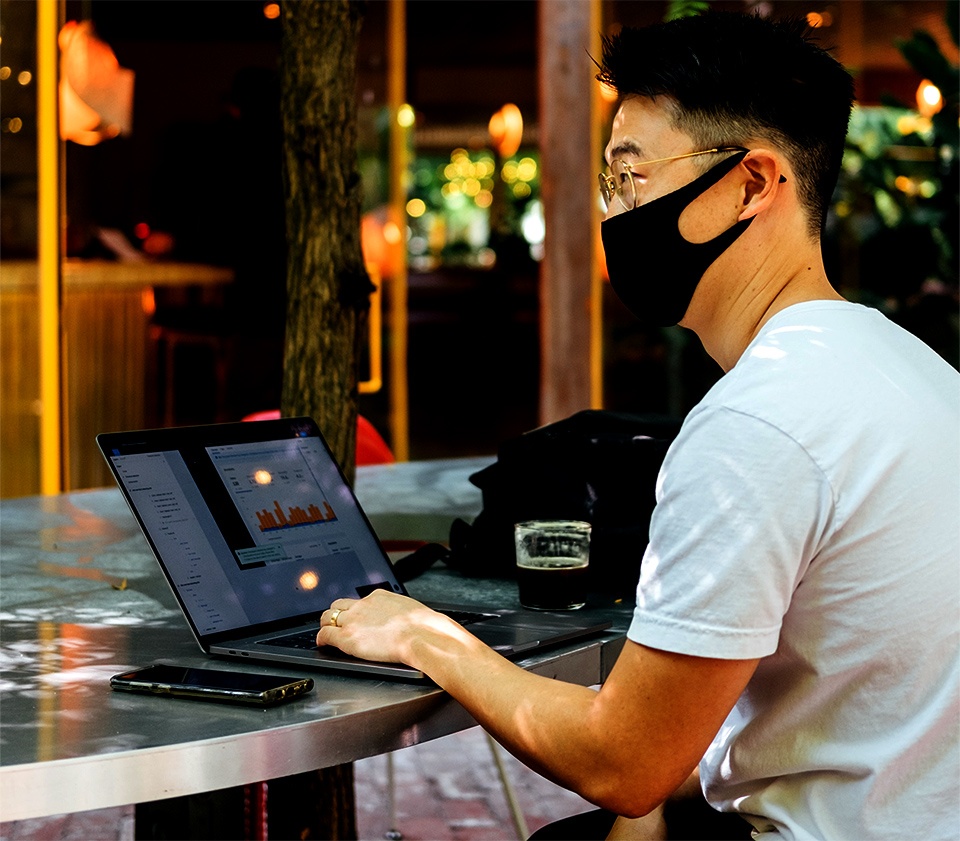We’re entering a nearly-Golden Age of customer experience, and in reality, a lot of the trends we were already seeing are just being accelerated now. What are some of those?
5 major shifts in customer experience
Contactless payments
In the USA, contactless payments have grown by 20%+ since the start of COVID. BFSI — Banking, Financial Services, Insurance — sector is the biggest consumer of IT services. It has been for some time, but you’re seeing it even more now because they need customer-driven solutions that allow for easy, intuitive, and contactless payments. BFSI companies now need (1) flexibility and (2) fast time to market above all else. That means approaching providers in B2B with necessary compliances and previous examples of iterating quickly for clients.
Some of those compliances you’re looking for are:
- ISO 9001:2015 certified
- PCI (Payment Card Industry) Compliant
- GDPR compliant
- COPC OSP compliant
- ISO 37500 Outsourcing Framework
- ITIL Compliant
Work from anywhere
This is the big one in terms of COVID shifts and customer experience (and the entire experience of working, really). The first wave of transition people needed to go through was moving their employees to home, and making sure their employees could serve the needs of customers from home, i.e. they had the right tech and connectivity. (We are only speaking about knowledge jobs here, not food delivery or anything.) We did a previous white paper on that topic. Then we did another one on business continuity once WfH was adopted. We’ve been talking about this a bunch. We see the future as a hybrid model of WfH and work-in-office, but it will likely take until summer 2021 (or autumn 2021) for that to be at scale.
The explosion of messaging
This exploded alongside UGC. In the first month or so of the pandemic, WhatsApp usage grew 40%, and most of that came from the coveted 18-to-35 demographic that brand-builders and marketers seek out the most. You saw similar growth in (obviously) Zoom, Microsoft Teams, Slack (which had some stock stumbles but overall grew), Facebook Messenger, and more. These were ways to get ahold of people in a virtually-driven world.
Tech vs. the human touch
For companies that were in a flat-footed cash position due to COVID, a natural inclination is cutbacks, layoffs, downsizing, and the embracing of automated processes and tech. Now, we’re a company that has proprietary tech (ConectysOS), but we fully believe in the intersection of technology and humans. The problem with tech right now is that it doesn’t solve everything — look at the challenges with distance learning during COVID — and even simpler Robotic Process Automation (RPA) projects can fail if executives think they are a “silver bullet” to solve all their problems. Tech is great. It’s very helpful for scaling. It’s very attractive to customers and clients. But it doesn’t solve every single problem. You need a mix of tech and human, which the best companies have been building in and emphasizing throughout COVID (and before).
Digital acceleration of everything
This might seem a counter-argument to the human vs. tech point, but it’s not. It’s actually a similar point. We are seeing an explosion of digital, messaging, UGC, etc. That’s how services are getting delivered, and conversations are happening these days. E-commerce and video gaming are rising rapidly because you can do them easily from home, especially with a lack of other options. It’s a very weird time. So digital is growing super-fast, and you need to have digital options for the customers you serve, i.e. contactless payments, an e-commerce option, forums, videos, virtual tours. It all varies by the specific business you’re in. We’re seeing a digital acceleration that we’ve already seen for years, but faster. The important point to remember is that humans still empower this digital acceleration, both by coding the platforms, but also by engaging in them, posting content, moderating them, being sources of call center questions about the platforms and orders made on them, and more. People still drive business. Tech is flashy and great, but people still drive business. You need both.
The summary
The coronavirus pandemic has forced companies to rethink what customer service means. Especially in times of crisis, a customer’s interaction with a company can create an immediate and lasting impact on their sense of trust and loyalty. Keeping a real-time eye on changing customer preferences and spotting major shifts in customer service is critical in these times.

















